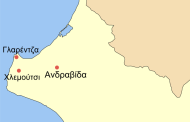 Today, Wednesday, 14 May, the Greek State and the contracting consortia will sign at the Ministry of Environment, in the presence of Prime Minister Antonis Samaras and Deputy Prime Minister Eleftherios Venizelos, the contracts for the exploration of hydrocarbon resources in three fields, namely in Ioannina, the Gulf of Patras and Katakolo port in the Peloponnese, from which 250 million barrels of oil could be extracted, according to the government.
Today, Wednesday, 14 May, the Greek State and the contracting consortia will sign at the Ministry of Environment, in the presence of Prime Minister Antonis Samaras and Deputy Prime Minister Eleftherios Venizelos, the contracts for the exploration of hydrocarbon resources in three fields, namely in Ioannina, the Gulf of Patras and Katakolo port in the Peloponnese, from which 250 million barrels of oil could be extracted, according to the government.
The Ministry of Environment estimates that if 100 million barrels of renewable resources are extracted from one field at an average price of $90 per barrel, the revenue will amount to around €6 billion, which in turn means that in the case of 250 million barrels extracted the amount will be €15 billion.
As announced by Minister of Environment Yiannis Maniatis, the Court of Audit had approved the texts of the contracts and had given the green light to start up the procedures for signing the rental contracts.
Let us recall that the consortia that will explore the fields are as follows:
– In Ioannina – Energean Oil and Gas-Petra Petroleum
– In the Gulf of Patras – Hellenic Petroleum – Edison – Petroceltic
– In Katakolo – Energean Oil and Gas – Trajan Oil and Gas
Obligations of the companies and the taxes they will pay
The contracts provide for a tax of 20% plus 5% regional tax, i.e. 25%. In addition, the companies are required to make a minimum investment of €60 million but in practice, they will exceed that amount at least twice. At the same time, the companies are obliged to take measures to protect the environment and train the Greek workers in the field of hydrocarbon resources. In addition to the 25% tax, the state will receive revenue from the rent that the companies will pay. The tax rate will remain constant for a long period of time to ensure the long-term return on investment. Moreover, the contracts contain a minimum binding programme of activities for each phase of the exploration works and a minimum financial commitment (with the issuance of a letter of guarantee) for the implementation of these activities.
The exploratory phase includes geological and geophysical studies, and primary drilling. The investment for this is fully borne by the contractor.
Environmental protection
The emphasis is on complying with the most stringent European requirements with regard to the legislation on environment. The measures to address the environmental consequences are divided into two parts as follows:
– Preventive activity in each stage of the exploration works, both in normal operation and in the event of an emergency, with the obligation to draw plans for crisis management.
– Development of relevant mechanisms to exercise effective control and supervision on all activities. The contractor is obliged to comply with clear and very strict rules covering the entire cycle of all exploration and production works, from planning to the final dismantling of an oil or natural gas extracting plant.
Training of Greek workers
It has been agreed with the investors to pay a specific amount per year to educate and train the workforce involved in oil extraction.
In a statement, Minister of Environment Yiannis Maniatis notes the following:
“Having established the institutional framework for the development of a new, promising market, namely the exploration and exploitation of hydrocarbon resources, today we put an end to our efforts by signing the contracts for the three fields in western Greece.
Our strategic priority is to take advantage of the comparative advantages of the country in favour of citizens and the national economy, with care for the environment. This priority brings a reasonable expectation for the production of new wealth and the creation of a significant number of new jobs, while revealing that Greece is attractive for investment. The benefits are numerous to local communities too as the works will provide substantial funds from fees and will strengthen the regional business activity.
In 2015 our country will be a different Greece, which will not only have emerged from the crisis and memoranda but, thanks to the energy sector, will have a national economy creating growth and prospects for the country and all citizens.”
Finally, based on the estimates of the Ministry of Environment, the contracts will bring the following significant benefits to the national economy:
– Each job in the oil industry will create 3.2 jobs in other sectors of the economy.
– Each dollar received by those directly employed in the oil industry will create nearly two more dollars for those employed in other sectors of the economy.
– Every dollar in value produced in the sector will lead to additional production.
GRReporter.info

















One Comment
aris
Πετρέλαιο το όπιο των ξεβράκωτων λαών.
Έχει σκεφτεί κανείς γιατί μετά την ανακάλυψη της υδρογονοβόμβας εδώ και 50-60 χρόνια, η ενέργεια σε αυτόν τον πλανήτη εξαρτάται ακόμα από το πανάκριβο πετρέλαιο?
Έχει σκεφτεί κανείς η υπερδύναμη Ρωσία τι ακριβώς παράγει?
Το τελευταίο το πέταξα για να σκεφτούν κάποιοι πιο βαθειά τις νέες αλλαγές στον πλανήτη.
Και εδώ που ξαφνικά βρήκαμε τα βρεμένα από του αγίου τέτοιου ανήμερα πετρέλαια στα Δυτικά, οι άλλοι στα Ανατολικά στήνουν εξέδρες και να δούμε που θα βγάλει.
14-5-2014
O εφημερίδες του τουρκικού τύπου, (Milliyet,Yeni Şafak) ασχολούνται σήμερα εκτενώς με την συνεργασία της αμερικανικής εταιρείας Shell με την Τουρκία, που προχωρεί στην μόνιμη εγκατάσταση πλατφόρμας άντλησης πετρελαίου, την οποία μάλιστα έχει ονομάσει χαρακτηριστικά, «Εθνική Πλατφόρμα», (Milli platforme), ανοιχτά του λιμένα της Αττάλειας, στα ύδατα της ανατολικής Μεσογείου, όπου ακόμα δεν έχει καθοριστεί (με ευθύνη της ελληνικής κυβέρνησης η ελληνική ΑΟΖ). Η ανακοίνωση για την εγκατάσταση της τουρκικής πλατφόρμας στην περιοχή, έγινε από το τουρκικό υπουργείο Ενέργειας, και ταυτόχρονα το τουρκικό ερευνητικό πλοίο, Barbaros συνεχίζει ανενόχλητο τις βόλτες-έρευνες του για την ανεύρεση ενεργειακών κοιτασμάτων σε κυπριακές αλλά και σε αμφισβητούμενες περιοχές στην ευρύτερη ανατολική Μεσόγειο,κλπ,κλπ,κλπ, κλπ.
Χουά χα χα χα χα χα χα χα.